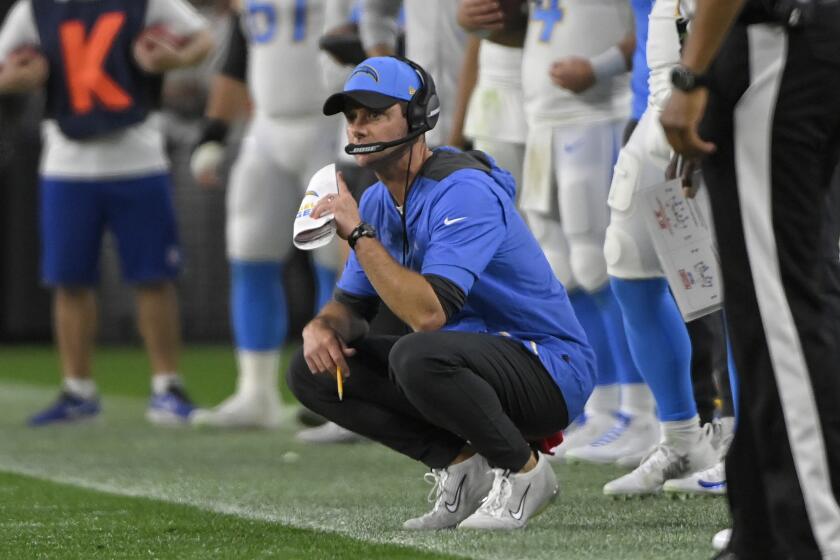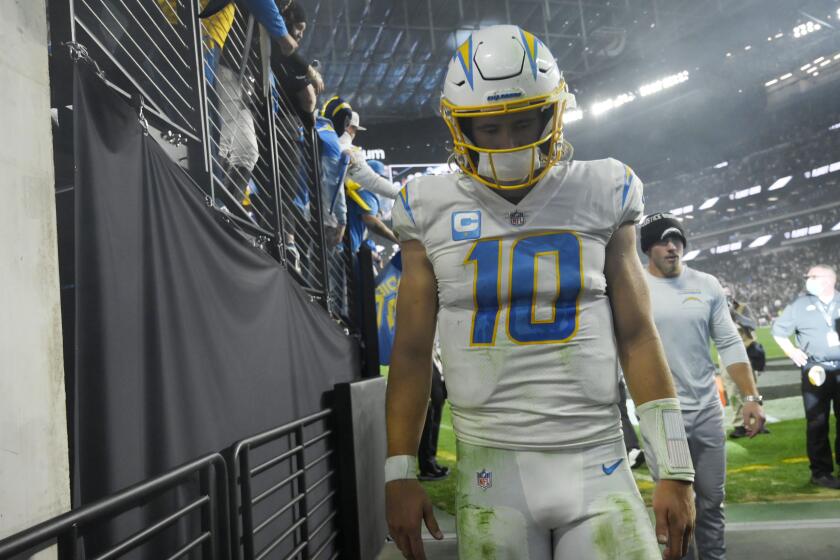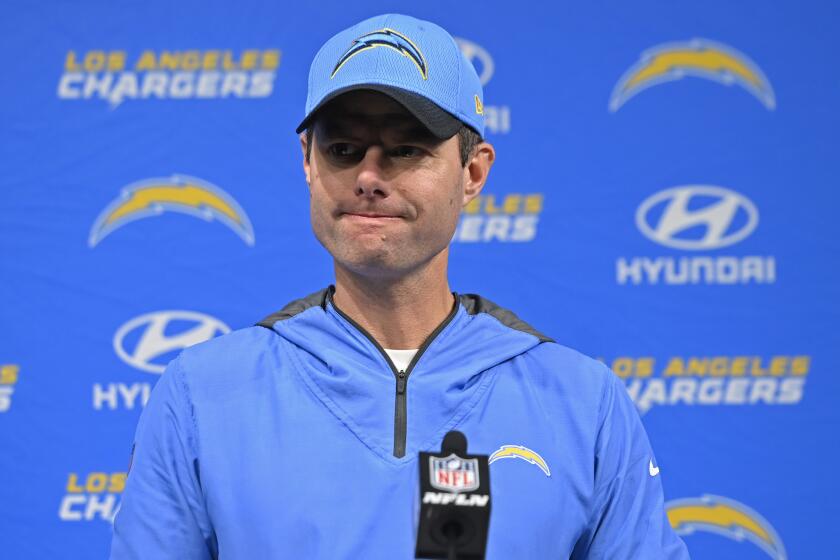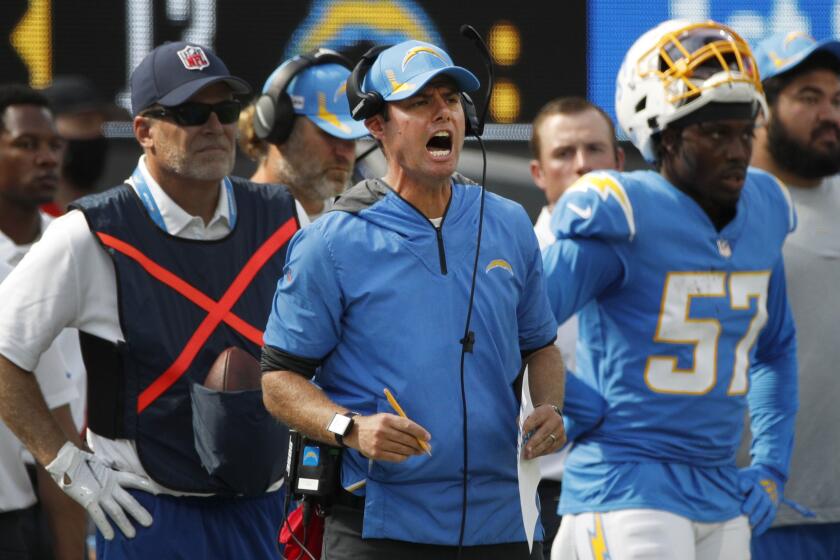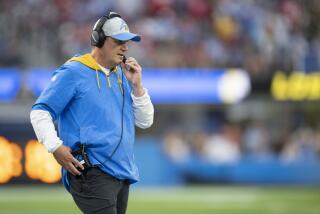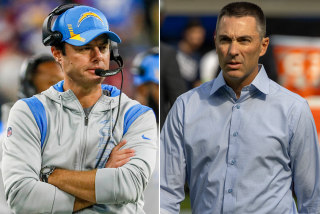Column: Right or wrong, coach Brandon Staley, and Chargers fans, must live with his decisions
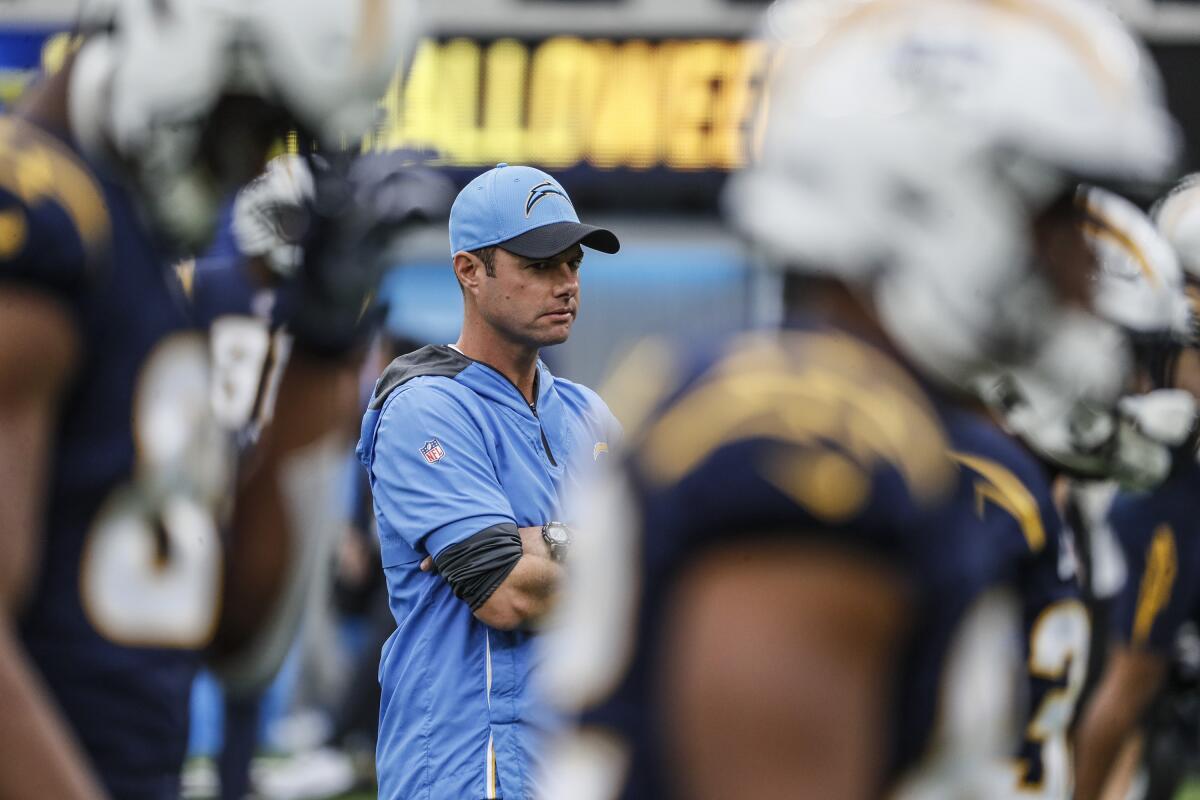
Five years after barging into town unwanted and unloved, the Chargers finally are making themselves at home.
They have a breathtaking young quarterback, with Justin Herbert capturing the imagination and LeBron-sized headlines.
They have an energized young fan base that slowly is taking over SoFi Stadium, with Chargers’ jerseys now seen from Valencia to San Clemente.
They have bundles of buzz, with folks still talking about that chilling Sunday night game against the Las Vegas Raiders, everyone marveling at their dramatic efforts despite a loss that knocked them from the playoffs.
In taking their first serious strides toward becoming Los Angeles’ favorite team, the Chargers have the right star, the right culture, the right branding … but have yet to answer the most important question.
Do they have the right coach?
Some questionable coaching decisions did not help the Chargers in their showdown against the Raiders, and now those glaring holes the team needs to fill become more visible.
Is bold, brainy but baffling Brandon Staley the best person to lead them into the hearts of this town?
His football intelligence is off the charts, but some game decisions make it appear he’s lost his mind. He’s a defensive whiz, yet his defense ranked among the worst in the league. He’s a players’ coach, yet his players sometimes ignore his pleas to play smart, racking up the league’s third-most penalties.
Everybody loves him, he’s engaging, accountable, and inspirational. After our 20-minute video call Wednesday, this columnist was ready to follow him into battle.
But after his first season as a head coach at any level, Staley was just 9-8 and one of the reasons America can’t marvel at Herbert in the playoffs.
It is unfair to say he will enter next season on the hot seat. But it is perfectly reasonable to expect him to evolve and grow and do whatever it takes to make sure Herbert doesn’t become another postseason-challenged Mike Trout.
Staley had an interesting honeymoon, but that all ended Sunday night in Las Vegas, and now comes the high and hard heat.
He’s unapologetic, unfazed, and ready for it.
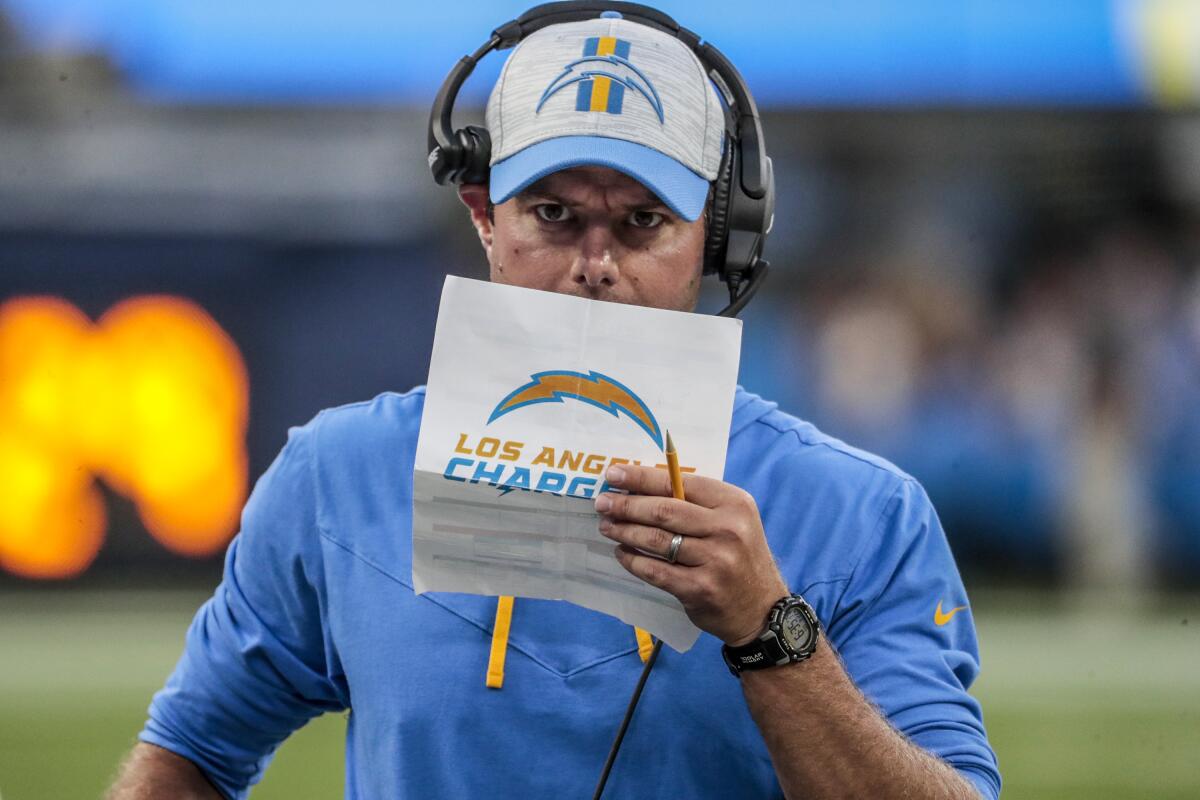
”Every fan and every media market has every right to scrutinize these decisions, it’s what makes professional sports so special,” Staley told me, adding, ”What people discover is that I had a really good reason behind what we did and why we did it. I felt like it would be an advantage situation for us. What I’m not scared of, what I’ll not shy away from, is competing to the fullest of our ability.”
No, the 39-year-old prodigy clearly is not scared, and give him credit for that. He’s not scared of being ripped for a seemingly dumb fourth-down call. He’s not scared of being excoriated for a late timeout call. He knows that might be difficult for traditionalists to understand, but he’s just not scared.
“What I’m trying to do is maximize our chances of winning. ... I’m not afraid of losing,” he said. “That’s a concept that’s difficult for some to grasp … but I know we wouldn’t have our record without our approach.”
The main complaint against him is his beloved fourth-down conversion attempts. Staley likes to go for it on fourth down, come hell or high-enough-to-drown-you water. But you knew that.
The problem was, on too many big fourth-down plays, Staley was ultimately haunted by his refusal to see past the analytics, adjust to the game situations, and simply kick or punt the dang ball. These sometimes controversial fourth-down attempts backfired on the Chargers enough to loudly blow them out of the playoff picture.
Justin Herbert did everything he could to get the Chargers into the playoffs but it wasn’t enough to overcome a determined Raiders team and its fans.
Earlier this season in a nationally televised home game against the Kansas City Chiefs, Staley blew three chances to kick makeable field goals when his fourth-down conversion attempts failed. The Chargers lost by six points in overtime. Those field goals would have won the game.
Then there was the decision even his most ardent backers challenged, in the third quarter against the Raiders on Sunday night, when Staley went for it on fourth-and-one from the Chargers’ 18-yard line.
THEIR 18-YARD LINE!
The Austin Ekeler run failed, the Raiders soon kicked an easy field goal and — guess what? — the Raiders eventually won by those three points.
Staley supporters will insist that his conversion obsession works and, indeed, the Chargers led the league with 22 fourth-down conversions. But only two teams — Chicago and Detroit — had more than the Chargers’ 34 attempts.
Their 65% success rate tied for fourth in the NFL, and they won games against Cleveland and Philadelphia while going five-for-five in crunch time fourth-down situations. But in the end, bigger than all that, the fourth-down attempts ultimately doomed them.
Except that Staley doesn’t see the decisions as fatal. He sees them as fortuitous. And he’s not going to change.
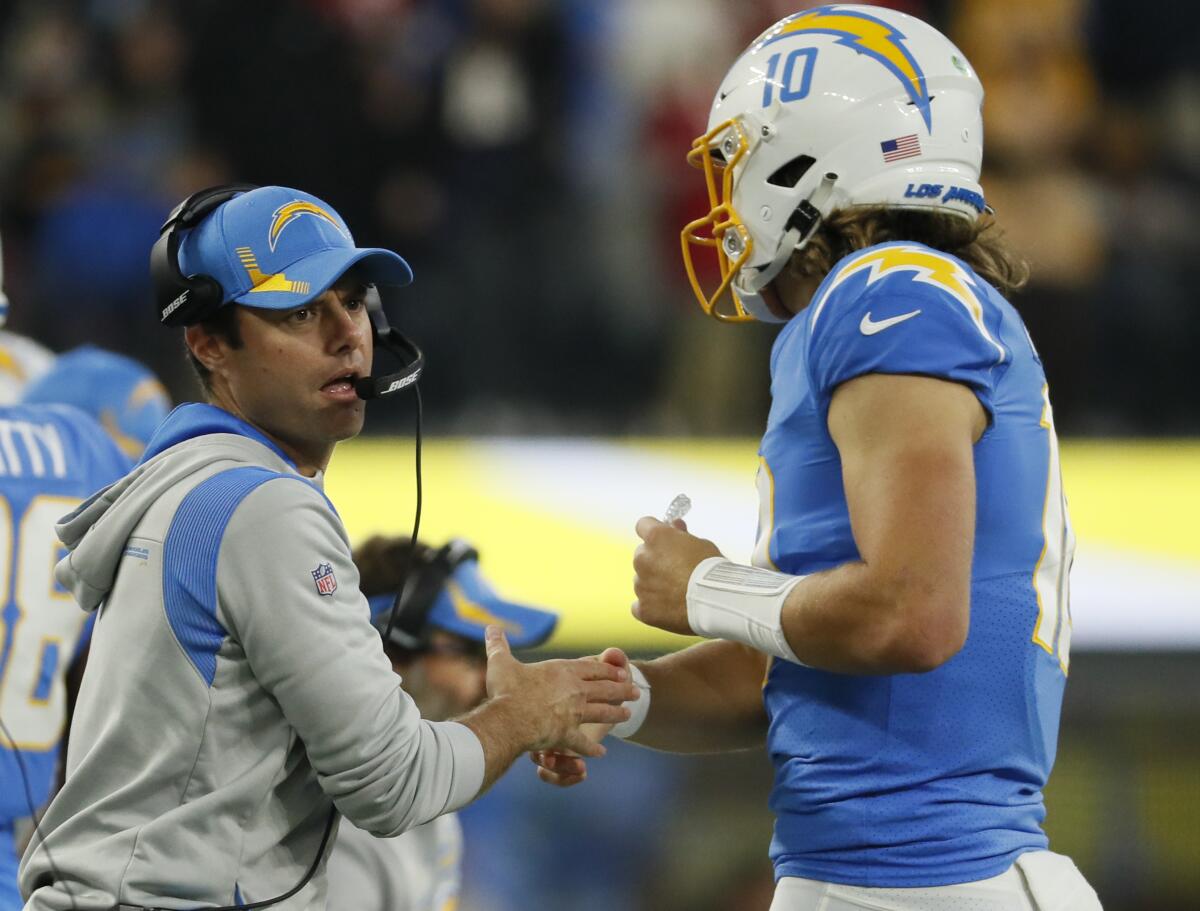
“My philosophy is to … maximize the strength of our team … maximize our ability to score the ball … that’s the name of the game,” he said, noting that with Herbert under center, any extra snap is a good one. “The number-one thing I had to do was maximize our quarterback, and I was able to do that … the decision making on fourth down, it allowed us to win a lot of games, and compete in a lot of games.”
Everyone calls him a gambler. He said that couldn’t be further from the truth.
“I didn’t make it here by being a gambler,” he said. “How I got here was through calculation, being tactical … I’m not being reckless with any of these decisions … it’s creating an advantage for us … and I’m not going to look back, because I know in the long run, it’s going to get our team to where it’s capable of going.”
This occasional insistence on seeing the game as a spreadsheet appeared to hurt him again with Sunday’s infamous timeout call, something which happened in Vegas that should have stayed in Vegas.
The Chargers are surprised they did not qualify for the playoffs, but they still have admiration for the job done by rookie head coach Brandon Staley.
It has been argued that Staley’s decision to call timeout to reset his defense with 38 seconds remaining in overtime had nothing to do with the Raiders’ Josh Jacobs gaining 10 yards on the next play and setting up Daniel Carlson’s game-winning field goal.
But watching the game from the Allegiant Stadium press box, this columnist saw something different. The Raiders’ body language and effort and intensity all indicated that they were simply running out the clock to ensure a tie game, which would have sent both teams to the playoffs.
The timeout by Staley seemed to startle the Raiders out of their relaxed pose and encourage them to gear up for one more play from scrimmage. Thus energized, the Raiders line blocked hard, Jacobs ran even harder, and soon the Chargers were going home for the summer.
It says here, if Staley had looked past the particulars of his defensive scheme and realized the human element that had taken over — look, look, the Raiders are playing it safe and settling for the tie! — he never would have called a timeout and both teams would have let the clock run out.
Staley vehemently disagrees.
“I hope people don’t feel like I cost our team. … I was trying to get the best defense out there to stop them and prevent them from being in field-goal range,” he said. “There’s no way I could have known they weren’t going to try to kick a game-winning field goal. If they were letting the clock run out, the formation they lined up at the end said, ‘I’m running it, I’m running it.’ Nothing about what they were doing said, ‘I’m not going for it here, I’m not trying to win.’ ”
Brandon Staley’s questionable playcalling on fourth down became the hallmark of his first season as Chargers coach. But was it as bad as some might think?
He will carry that timeout with him into next season. He will carry the fourth-down failures. Yet he also will carry a team that loves his aggressiveness and admires his transparency and consistently plays hard for him.
“The number one thing I was trying create here was an identity, a belief system,” he said. ‘’I feel like I was able to do that. … I feel like I got that right.”
He did. But with his franchise on the verge of becoming a city cornerstone, he needs to turn that belief into a postseason while proving he can deftly manage a game and smartly put his team in the best position to win.
More than anything, into next season he will carry that question.
Is Brandon Staley the right coach for the Chargers?
If nothing else, he’s not scared of the answer.
More to Read
Go beyond the scoreboard
Get the latest on L.A.'s teams in the daily Sports Report newsletter.
You may occasionally receive promotional content from the Los Angeles Times.

